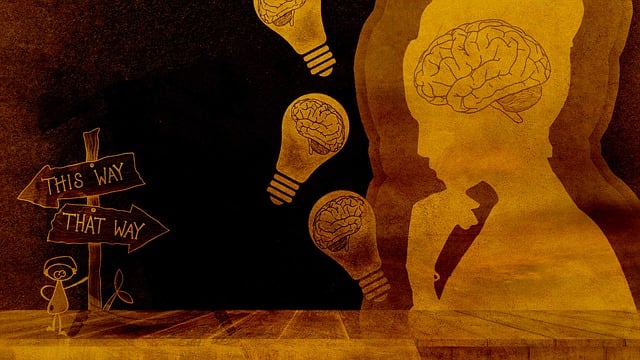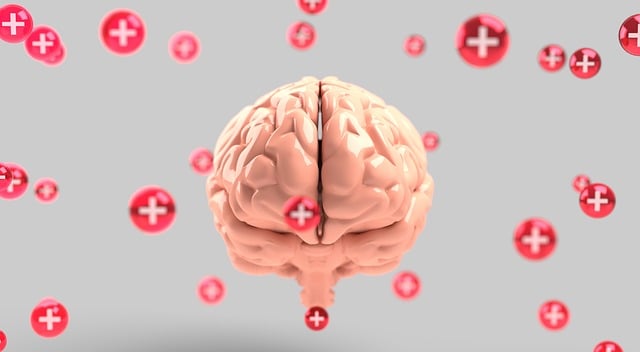Golden First Responders Therapy (GFRT) is a revolutionary mental wellness program that empowers individuals facing trauma or high-stress situations by teaching emotional agility and resilience through Mind Over Matter principles and Emotional Intelligence development. This holistic approach focuses on self-care routine establishment and stress management, cultivating healthier relationships and enhancing overall well-being. Evaluated using a combination of quantitative (surveys, data analysis) and qualitative (interviews, focus groups) methods, GFRT tailors strategies based on client needs, measured through KPIs like symptom reduction, satisfaction, engagement, and stigma reduction. Continuous improvement is driven by feedback loops, incorporating client and professional input, and data-driven approaches that optimize care delivery for enhanced crisis intervention and risk management outcomes.
Mental wellness programs are essential components of modern healthcare, and effective evaluation methods are crucial for their success. This article explores innovative approaches like Golden First Responders Therapy, a unique method gaining traction in mental health support. We delve into various evaluation techniques, highlighting key performance indicators (KPIs) to measure program effectiveness. Additionally, we discuss continuous improvement strategies through feedback loops and data analysis, emphasizing the importance of adaption and refinement for optimal mental wellness outcomes.
- Understanding Golden First Responders Therapy: A Unique Approach
- Evaluation Methods for Mental Wellness Programs
- Measuring Success: Key Performance Indicators (KPIs) in Mental Health
- Continuous Improvement: Feedback Loops and Data Analysis Techniques
Understanding Golden First Responders Therapy: A Unique Approach

Golden First Responders Therapy (GFRT) is a pioneering approach that focuses on empowering individuals to navigate life’s challenges with resilience and emotional agility. This therapy is particularly effective for those who have experienced trauma or face high-stress situations, offering them unique tools to recover and thrive. The method intertwines proven Mind Over Matter principles with the cultivation of Emotional Intelligence, enabling clients to develop a profound understanding of their emotions and responses.
GFRT goes beyond traditional therapy by emphasizing self-care routine development as a cornerstone for better mental health. It equips individuals with strategies to recognize and manage stress, fostering a sense of control and empowerment. Through this holistic process, participants learn to transform their relationships with themselves and others, leading to improved overall well-being.
Evaluation Methods for Mental Wellness Programs

Mental wellness programs often employ various evaluation methods to assess their effectiveness and make informed improvements. One such innovative approach is the Golden First Responders Therapy, which focuses on early intervention and support for individuals facing mental health challenges. This method prioritises community outreach and accessibility, aiming to improve self-esteem and provide essential skills for conflict resolution techniques in high-risk areas.
The evaluation process involves a combination of quantitative and qualitative assessments. Quantitative methods may include surveys and data analysis to track changes in symptoms and overall mental well-being over time. Qualitative approaches, such as individual interviews or focus groups, offer deeper insights into participants’ experiences, preferences, and perceived benefits of the program. By combining these techniques, program implementers can gain a comprehensive understanding of their impact, identify areas for enhancement, and ensure that community outreach programs are tailored to meet the unique needs of their target population.
Measuring Success: Key Performance Indicators (KPIs) in Mental Health

Measuring success is a vital component of any mental wellness program, ensuring that initiatives are effective and positively impact individuals’ lives. Key Performance Indicators (KPIs) serve as measurable benchmarks to evaluate the progress and outcomes of therapy and support services. For Golden First Responders Therapy, a unique approach targeting those affected by mental illness, KPIs can be tailored to reflect the specific goals and needs of this population.
One primary KPI could be the reduction in symptoms associated with mental health conditions, such as anxiety or depression, measured through standardized assessment tools. Additionally, tracking client satisfaction and engagement in therapy is essential, gauging the effectiveness of the program’s interventions. The success of Golden First Responders Therapy can also be evaluated by measuring the effectiveness of stigma reduction efforts, as this plays a significant role in encouraging individuals to seek help for mental illness. By employing these KPIs, therapists and support staff can adapt their strategies, ensuring that empathy-building techniques and anxiety relief programs are tailored to meet the unique needs of each client, ultimately enhancing the overall success of the mental wellness program.
Continuous Improvement: Feedback Loops and Data Analysis Techniques

Mental wellness programs, like Golden First Responders Therapy, strive for continuous improvement to better serve their clients. Feedback loops are a critical component of this process, allowing for ongoing assessment and adjustment based on real-time data. By collecting feedback from both clients and mental health professionals involved in crisis intervention guidance and risk management planning, programs can identify areas needing enhancement.
Data analysis techniques play a pivotal role in interpreting feedback and making informed decisions. Quantitative methods, such as surveys and metrics tracking, provide measurable insights into the program’s effectiveness. Qualitative analyses, like thematic coding of client Mental Wellness Journaling Exercises, offer deeper understanding of individual experiences and emotions. Integrating these data-driven approaches ensures that mental health professionals can refine their strategies, ultimately enhancing care delivery and outcomes for those in need.
Mental wellness programs, like Golden First Responders Therapy, require robust evaluation methods to ensure effectiveness. By utilizing key performance indicators (KPIs) and implementing continuous improvement strategies through feedback loops and data analysis, we can measure success and refine these programs to better meet the needs of those they serve. This approach not only enhances mental health outcomes but also underscores the importance of innovative therapies in today’s digital era.














